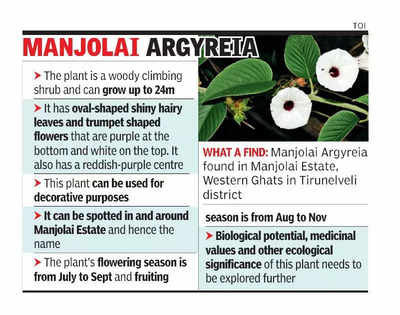Researchers discoverplantspecies at Manjolai Estate

Chennai: Researchers from The Madura College and Madras Christian College discovered a new plant species, Manjolai argyreia (argyreia manjolaiensis), at Manjolai Estate in the Kalakkad Mundanthurai tiger reserve in the western ghats of Tirunelveli district. The plant, belonging to the argyreia species, is a woody climbing shrub that can grow up to 24m high with shiny hairy leaves and trumpet-shaped flowers. The flowers have a purple base, white top, and a reddish-purple centre.
"We found the plant, which appeared different, during the botanical exploration of Manjolai Estate. It was spotted only in the surrounding areas of the Manjolai area, and we named it Manjolai argyreia," said S Karuppusamy, associate professor of botany at The Madura College in Madurai.
He was one of the authors of the research article that announced the discovery in ‘Rheedea', a journal of the Indian association for angiosperm taxonomy. Other authors are P B S Yadav, a research scholar from The Madura College, and P Selva Singh Richard, associate professor of botany from Madras Christian College.
"There are 37 argyreia species recorded in India, 30 of which were recorded in the western ghats. This one can be used for decorative purposes," Richard said. Researchers said the new species is endemic to the western ghats.
During the botanical exploration, researchers collected specimens near Manimuthar waterfalls on the way to Manjolai Estate. However, the specimen could not be identified, and they compared it with digital images of online herbaria databases.
"After a detailed study, experts said it was a new species of argyreia, and our paper was published in a special Rheedea edition for convolvulaceae (one of the families of flowering plants)," Richard added. This plant's flowering season is from July to Sept, and the fruiting season is from Aug to Nov.
The finding of the new plant species assumes significance as Manjolai Tea Estate has been declared a reserve forest by the state. "The southern western ghats are rich in biodiversity, and further surveys could reveal many unknown species in the 45,000acre Manjolai Estate," Karuppusamy added.